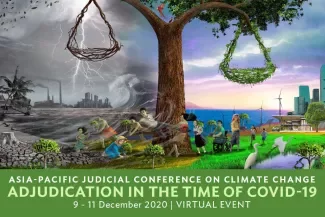The Asian Development Bank Hosts The Asia Pacific Judicial Conference on Climate Change: Adjudication in the Time of Covid-19

The emergence of COVID-19 has brought major challenges to all peoples of the world in unexpected ways. Many point to our unabated abuse of nature as the underlying cause of this pandemic. It has amplified numerous existing challenges such as weak health institutions and lack of social protection for the most vulnerable. It has also added to the already alarming issue of rapid climate change, presenting more complexities for the processes of adjudication and the achievement of climate justice. There were growing calls for the global community to act on climate change with the same rigor and intensity as the COVID pandemic. It was clear that without urgent action, the consequences of runaway global warming would far outweigh the impacts of the virus. Judiciaries around the world must continue to dispense justice for people and the environment in this “new normal.” Creative and innovative responses by judges were key to ensuring that our recovery from that pandemic will move towards a just, resilient, responsible and sustainable normal, where the health of people and nature are balanced, and principles of environmental law and justice are at the center of recovery plans.
This virtual conference, the Asia Pacific Judicial Conference on Climate Change: Adjudication in the Time of COVID-19, was a continuation of the annual gathering of judges under the banner of the Asian Judges Network on Environment. The event was co-organized by the Asian Development Bank and the United Nations Environment Programme, with support from the Global Judicial Institute on the Environment and ClientEarth. The conference has brought together the judges from South and Southeast Asia, Northeast Asia, the Pacific, and other regions to highlight the need for urgent action and to continue to address the climate crisis. Increasing climate litigation, especially in Asia and the Pacific, required judges to be able to adjudicate in bold, innovative and sometimes imaginative ways. Judges could play a pivotal role in shifting and influencing pandemic-recovery policies towards those that address the causes and effects of climate change as a priority. Judges thus needed to ensure access to justice and ongoing adjudication of environmental cases, including those on climate change, despite the continuing challenges associated with COVID-19, in order to pave the way for a great societal “reset” and sustainable recovery.
The Conference was divided into a pre-conference Webinar, three (3) Technical Sessions and a participatory Breakout Session.
The pre-conference webinar on Judges as Emergency and Disaster Managers discussed climate and COVID-related litigation, and identified the role of courts and judges in this discourse.
- The first technical session of the conference, on Climate Change, Sustainable Habitats and Zoonosis, began with the scientific context of zoonosis – providing the background of the current pandemic. This was followed by an analysis of how pandemics can be averted through ecosystem resilience and promoting environmental rights and justice.
- The second technical session - Judicial Techniques: Adapting to the “Smart Normal” - explored how judges and legal practitioners could cope during those times. The presentations explored access to justice issues during the pandemic, including the issues associated with “virtual” courtrooms, while discussing judicial challenges and innovative solutions.
- The breakout session involved the allocation of all participants to electronic ‘breakout rooms.’ Each breakout room had a separate topic for discussion and was moderated by a designated chair, working with a rapporteur. At the conclusion of the breakout room discussion, there was a plenary session to enable a report to be given by each breakout room group.
- The final technical session, on The Great Reset - Recovering from COVID-19 in a Resilient, Responsible and Sustainable Way, explored the path that the global community should take in the post-COVID world, through a combination of “resets” and continued climate action.